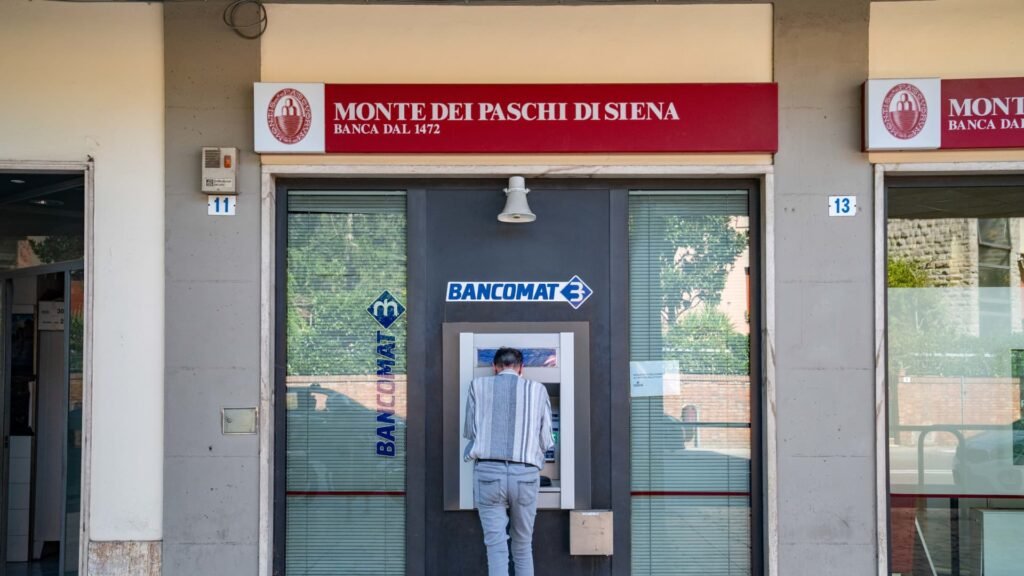Banking analysts are assessing the possibility of bank mergers in Italy.
Bloomberg | Bloomberg | Getty Images
MILAN, Italy — European policymakers have long been keen to create bigger banks across the continent.
Italy may be getting its wish with some big M&A deals, analysts say.
Several years after the region’s sovereign debt crisis and the government bailout of Banco Monte dei Paschi (BMPS) that saved the bank from collapse, many are looking at Italy’s banking industry with new eyes.
“If you assess the individual banks in Italy, it’s hard not to believe that something is going to happen over the next 12 months or so,” Antonio Reale, co-head of European banking at Bank of America, told CNBC.
Reale stressed that BMPS needed to be restructured and reprivatised, and said UniCredit now had a “relatively large pile of surplus capital” and, more broadly, that the Italian government was committed to a new industrial policy.
UniCreditIn particular, the company continues to surprise markets with big quarterly profit upsides, making 8.6 billion euros last year (up 54% from the previous year) and pleasing investors through share buybacks and dividends.
Meanwhile, BMPS, which was rescued in 2017, must eventually be returned to private hands under an agreement between European regulators and the Italian government. Italy’s Economy Minister Giancarlo Giorgetti said in March that there was a “concrete commitment” with the European Commission to sell the government’s stake in BMPS.
“In general, we believe there is room for consolidation in markets such as Italy, Spain and Germany,” Morningstar senior vice president Nicola De Caro told CNBC in an email, adding that “several structural obstacles exist, making domestic consolidation more likely than cross-border mergers in Europe.”
He added that despite recent consolidation in Italy’s banking industry, including Intesa Ubi, BPER Carige and Banco Bpm, “there is still a significant number of banks and decentralisation at the mid-sized level.”
“UniCredit, BMPS and some mid-sized banks are likely to play a role in the future consolidation of the Italian banking sector,” De Caro added.
UniCredit Chief Executive Andrea Orsel suggested in an interview with CNBC in July that a deal in Italy was not possible at current prices, but said it could not be ruled out if market conditions changed.
“Despite our performance, we’re still trading at a discount to the industry average. So if I were to make such an acquisition, I would have to tell shareholders, this is strategic, but it would actually be dilutive to earnings and I’m not going to do it,” he said.


“But if the situation changes, we’re here,” he added.
Barclays analyst Paola Savione believes that any M&A deals involving Italian banks will face high hurdles if they do take place.
“Monte dei Paschi is looking for partners and UniCredit is looking for potential targets, so in theory there could be multiple combinations emerging from these banks, but none are in urgent need of one,” she told CNBC in an email.
European officials have become increasingly vocal about the need for bigger banks — French President Emmanuel Macron, for example, said in an interview with Bloomberg in May that Europe’s banking sector needs more consolidation — but some remain skeptical of so-called mega-acquisitions. In Spain, for example, the government voted against BBVA’s proposed takeover of Sabadell in May.
“Europe needs bigger, stronger and more profitable banks – there’s no denying that,” Bank of America’s Reale said, adding that there were differences between Spain and Italy.
“Spain has come a long way. There has been a big wave of integration.[ing] “There has been an oversupply since just after the global financial crisis and up until more recently, with many banks having in one way or another exited the market. Italy is much more fragmented when it comes to the banking market,” he added.






